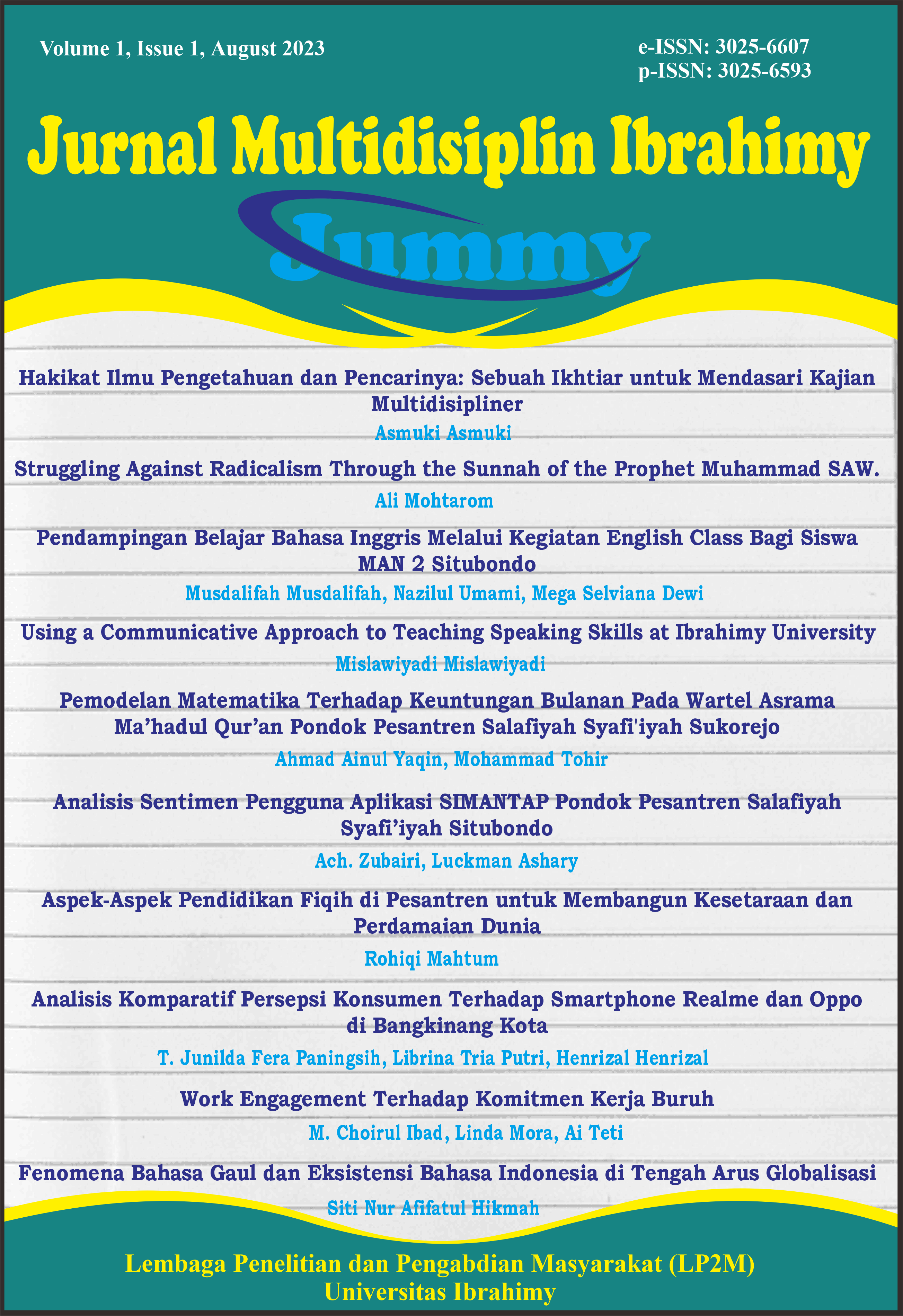Fenomena Bahasa Gaul dan Eksistensi Bahasa Indonesia di Tengah Arus Globalisasi
DOI:
https://doi.org/10.35316/jummy.v1i1.3612Keywords:
Slang language, existence, IndonesianAbstract
The phenomenon of slang is a social reality in the era of globalization. Language has meaning in every statement or self-portrait. This research aims to study the validity of slang and its existence in the era of globalization. This study uses a qualitative method using a type of phenomenology. The data used are texts/documents, dialogues and other everyday phenomena and their existence. Data collection techniques were carried out by examining several natural phenomena related to adolescent slang. The material is then analyzed using Miles and Huberman Flow with the stages of data collection, data reduction, data presentation and verification. The results of this research show the impact of the slang phenomenon, namely (a) the existence of the Indonesian language is threatened by the marginalization of slang, (b) the collapse of Indonesian language standards, (c) the extinction of the Indonesian language, and d) distrust at the hands of Indonesians. Factors related to the slang phenomenon are (a) the spread of the internet and social networks, (b) environmental impacts, (c) the role of the media, and (d) developments over time.
References
Ahmad, A., & Nurhidaya, N. (2020). Media sosial dan tantangan masa depan generasi milenial. Avant Garde, 8(2), 134–148. https://doi.org/10.36080/ag.v8i2.1158
Ahn, K.-H., & Merwade, V. (2014). Quantifying the relative impact of climate and human activities on streamflow. Journal of Hydrology, 515, 257–266. https://doi.org/10.1016/j.jhydrol.2014.04.062
Aulia, L. R., Setiadarma, A., & Supratman, S. (2023). Fenomenologi Pola Komunikasi Interpersonal Pada Pasangan Menikah (Studi Love Language Dalam Usia Pernikahan 0-5 Tahun). IKRA-ITH HUMANIORA: Jurnal Sosial Dan Humaniora, 7(2), 103–121.
Blackledge, A., & Creese, A. (2014). Heteroglossia as practice and pedagogy. Springer.
Dirgantoro, G. S. (2019). Intertekstualitas Lirik Lagu Jogja Hip-hop Foundation dalam Karya Seni Kontemporer. UNIVERSITAS NEGERI JAKARTA.
El Junusi, R. (2020). Digital marketing during the pandemic period; A study of islamic perspective. Journal of Digital Marketing and Halal Industry, 2(1), 15–28. https://doi.org/10.21580/jdmhi.2020.2.1.5717
Harrison, K. D. (2007). When languages die: The extinction of the world’s languages and the erosion of human knowledge. Oxford University Press.
Hikmah, S. N. A. (2022). Multicultural-Based Literary Education in the Era of Society 5.0. Jurnal Ilmiah Pendidikan Holistik (JIPH), 1(1), 11–30.
Junadi, S., & Laili, R. K. (2021). Fenomena Bahasa Gaul sebagai Kreativitas Linguistik dalam Media Sosial Instagram pada Era Milenial. Jurnal PENEROKA: Kajian Ilmu Pendidikan Bahasa Dan Sastra Indonesia, 1(01), 69–89. https://doi.org/10.30739/peneroka.v1i01.741
Mujib, A. (2009). Hubungan bahasa dan kebudayaan (perspektif sosiolinguistik). Adabiyyat, 8(1), 141–154.
Nurhasanah, N. (2014). Pengaruh Bahasa Gaul Terhadap Bahasa Indonesia. Forum Ilmiah, 11(1), 15–21.
Onwuegbuzie, A. J., & Weinbaum, R. K. (2016). Mapping Miles and Huberman’s Within-Case and Cross-Case Analysis Methods onto the Literature Review Process. Journal of Educational Issues, 2(1), 265–288.
Pease, A., & Pease, B. (2016). Why Men Don’t Listen & Women Can’t Read Maps: How to spot the differences in the way men & women think. Hachette UK.
Pegrum, M. (2011). Modified, multiplied, and (re-) mixed: Social media and digital literacies. In Digital education: Opportunities for social collaboration (pp. 9–35). Springer.
Qomar, M. (2015). Islam Nusantara: Sebuah Alternatif Model Pemikiran, Pemahaman, dan Pengamalan Islam. El Harakah: Jurnal Budaya Islam, 17(2), 198–217. https://doi.org/10.18860/el.v17i2.3345
Rohman, N. (2021). Behaviorism Theory Analysis (Thorndike) In Mathematics And Indonesian Language Sdn Upt Xvii Mukti Jaya Aceh Singkil. Abdau: Jurnal Pendidikan Madrasah Ibtidaiyah, 4(2), 223–236.
Saputra, N., & Aida, N. (2019). Keberadaan penggunaan bahasa Indonesia pada generasi milenial. Prosiding SEMDI-UNAYA (Seminar Nasional Multi Disiplin Ilmu UNAYA), 3(1), 368–383.
Sidiq, U., Choiri, M., & Mujahidin, A. (2019). Metode penelitian kualitatif di bidang pendidikan. Journal of Chemical Information and Modeling, 53(9), 1–228.
Sifianou, M. (2013). The impact of globalisation on politeness and impoliteness. Journal of Pragmatics, 55, 86–102. https://doi.org/10.1016/j.pragma.2013.05.016
Storper, M. (1992). The limits to globalization: technology districts and international trade. Economic Geography, 68(1), 60–93.
Suleman, J., & Islamiyah, E. P. N. (2018). Dampak penggunaan bahasa gaul di kalangan remaja terhadap bahasa Indonesia. Prosiding Seminar Nasional Bahasa Dan Sastra Indonesia (SENASBASA), 2(2), 153–158.
Syamsuddin, A. R., & Damaianti, V. S. (2015). Metode penelitian pendidikan bahasa. PT. Remaja Rosda Karya.
Zhou, Y., & Fan, Y. (2013). A Sociolinguistic Study of American Slang. Theory & Practice in Language Studies, 3(12).
Downloads
Published
How to Cite
Issue
Section
License












_by_Matematohir.jpg)


